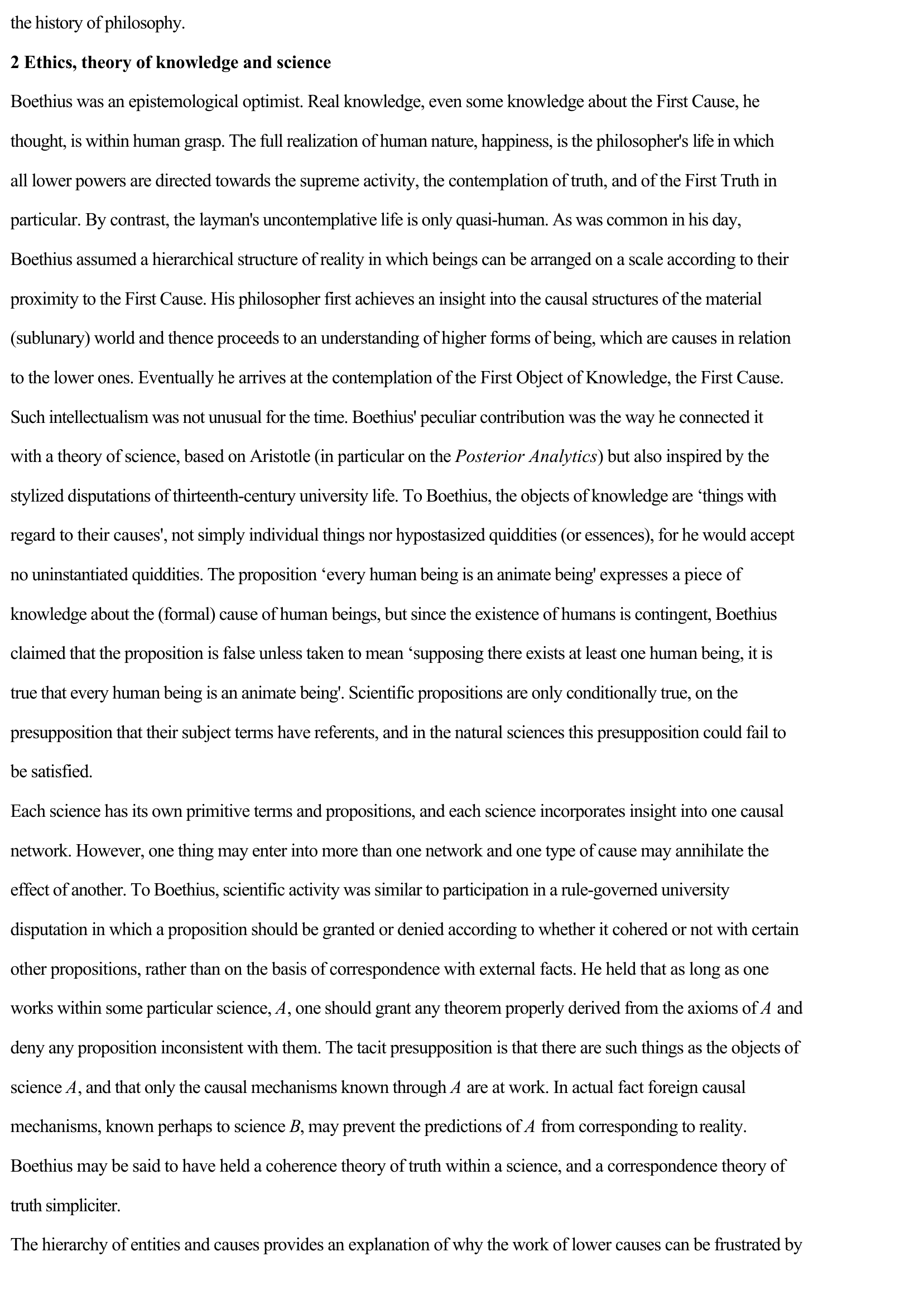Boethius of Dacia
Publié le 22/02/2012

Extrait du document
«
the history of philosophy.
2 Ethics, theory of knowledge and science
Boethius was an epistemological optimist.
Real knowledge, even some knowledge about the First Cause, he
thought, is within human grasp.
The full realization of human nature, happiness, is the philosopher's life in which
all lower powers are directed towards the supreme activity, the contemplation of truth, and of the First Truth in
particular.
By contrast, the layman's uncontemplative life is only quasi-human.
As was common in his day,
Boethius assumed a hierarchical structure of reality in which beings can be arranged on a scale according to their
proximity to the First Cause.
His philosopher first achieves an insight into the causal structures of the material
(sublunary) world and thence proceeds to an understanding of higher forms of being, which are causes in relation
to the lower ones.
Eventually he arrives at the contemplation of the First Object of Knowledge, the First Cause.
Such intellectualism was not unusual for the time.
Boethius' peculiar contribution was the way he connected it
with a theory of science, based on Aristotle (in particular on the Posterior Analytics ) but also inspired by the
stylized disputations of thirteenth-century university life.
To Boethius, the objects of knowledge are ‘things with
regard to their causes' , not simply individual things nor hypostasized quiddities (or essences), for he would accept
no uninstantiated quiddities.
The proposition ‘every human being is an animate being' expresses a piece of
knowledge about the (formal) cause of human beings, but since the existence of humans is contingent, Boethius
claimed that the proposition is false unless taken to mean ‘supposing there exists at least one human being, it is
true that every human being is an animate being' .
Scientific propositions are only conditionally true, on the
presupposition that their subject terms have referents, and in the natural sciences this presupposition could fail to
be satisfied.
Each science has its own primitive terms and propositions, and each science incorporates insight into one causal
network.
However, one thing may enter into more than one network and one type of cause may annihilate the
effect of another.
To Boethius, scientific activity was similar to participation in a rule-governed university
disputation in which a proposition should be granted or denied according to whether it cohered or not with certain
other propositions, rather than on the basis of correspondence with external facts.
He held that as long as one
works within some particular science, A, one should grant any theorem properly derived from the axioms of A and
deny any proposition inconsistent with them.
The tacit presupposition is that there are such things as the objects of
science A, and that only the causal mechanisms known through A are at work.
In actual fact foreign causal
mechanisms, known perhaps to science B, may prevent the predictions of A from corresponding to reality.
Boethius may be said to have held a coherence theory of truth within a science, and a correspondence theory of
truth simpliciter.
The hierarchy of entities and causes provides an explanation of why the work of lower causes can be frustrated by.
»
↓↓↓ APERÇU DU DOCUMENT ↓↓↓
Liens utiles
- Boethius, Anicius Manlius Severinus
- Encyclopedia of Philosophy: BOETHIUS AND PHILOPONUS
- Maraini, Dacia - littérature.

































